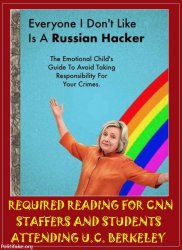livingston
20×102mm Vulcan
A New Report Raises Big Questions About Last Year’s DNC Hack
Former NSA experts say it wasn’t a hack at all, but a leak—an inside job by someone with access to the DNC’s system
It is now a year since the Democratic National Committee’s mail system was compromised—a year since events in the spring and early summer of 2016 were identified as remote hacks and, in short order, attributed to Russians acting in behalf of Donald Trump. A great edifice has been erected during this time. President Trump, members of his family, and numerous people around him stand accused of various corruptions and extensive collusion with Russians. Half a dozen simultaneous investigations proceed into these matters. Last week news broke that Special Counsel Robert Mueller had convened a grand jury, which issued its first subpoenas on August 3. Allegations of treason are common; prominent political figures and many media cultivate a case for impeachment.
The president’s ability to conduct foreign policy, notably but not only with regard to Russia, is now crippled. Forced into a corner and having no choice, Trump just signed legislation imposing severe new sanctions on Russia and European companies working with it on pipeline projects vital to Russia’s energy sector. Striking this close to the core of another nation’s economy is customarily considered an act of war, we must not forget. In retaliation, Moscow has announced that the United States must cut its embassy staff by roughly two-thirds. All sides agree that relations between the United States and Russia are now as fragile as they were during some of the Cold War’s worst moments. To suggest that military conflict between two nuclear powers inches ever closer can no longer be dismissed as hyperbole.
All this was set in motion when the DNC’s mail server was first violated in the spring of 2016 and by subsequent assertions that Russians were behind that “hack” and another such operation, also described as a Russian hack, on July 5. These are the foundation stones of the edifice just outlined. The evolution of public discourse in the year since is worthy of scholarly study: Possibilities became allegations, and these became probabilities. Then the probabilities turned into certainties, and these evolved into what are now taken to be established truths. By my reckoning, it required a few days to a few weeks to advance from each of these stages to the next. This was accomplished via the indefensibly corrupt manipulations of language repeated incessantly in our leading media.
A New Report Raises Big Questions About Last Year’s DNC Hack
Former NSA experts say it wasn’t a hack at all, but a leak—an inside job by someone with access to the DNC’s system
It is now a year since the Democratic National Committee’s mail system was compromised—a year since events in the spring and early summer of 2016 were identified as remote hacks and, in short order, attributed to Russians acting in behalf of Donald Trump. A great edifice has been erected during this time. President Trump, members of his family, and numerous people around him stand accused of various corruptions and extensive collusion with Russians. Half a dozen simultaneous investigations proceed into these matters. Last week news broke that Special Counsel Robert Mueller had convened a grand jury, which issued its first subpoenas on August 3. Allegations of treason are common; prominent political figures and many media cultivate a case for impeachment.
The president’s ability to conduct foreign policy, notably but not only with regard to Russia, is now crippled. Forced into a corner and having no choice, Trump just signed legislation imposing severe new sanctions on Russia and European companies working with it on pipeline projects vital to Russia’s energy sector. Striking this close to the core of another nation’s economy is customarily considered an act of war, we must not forget. In retaliation, Moscow has announced that the United States must cut its embassy staff by roughly two-thirds. All sides agree that relations between the United States and Russia are now as fragile as they were during some of the Cold War’s worst moments. To suggest that military conflict between two nuclear powers inches ever closer can no longer be dismissed as hyperbole.
All this was set in motion when the DNC’s mail server was first violated in the spring of 2016 and by subsequent assertions that Russians were behind that “hack” and another such operation, also described as a Russian hack, on July 5. These are the foundation stones of the edifice just outlined. The evolution of public discourse in the year since is worthy of scholarly study: Possibilities became allegations, and these became probabilities. Then the probabilities turned into certainties, and these evolved into what are now taken to be established truths. By my reckoning, it required a few days to a few weeks to advance from each of these stages to the next. This was accomplished via the indefensibly corrupt manipulations of language repeated incessantly in our leading media.
A New Report Raises Big Questions About Last Year’s DNC Hack


